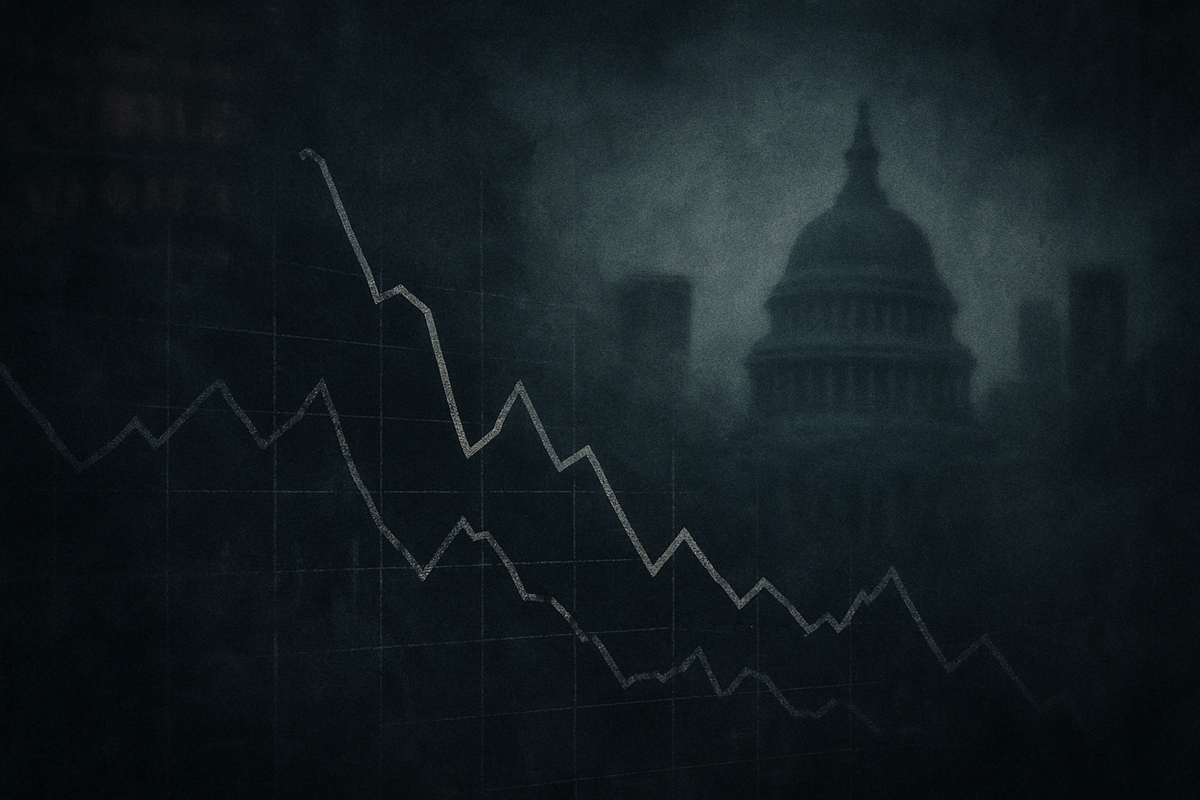Economic Data Blackout: Government Shutdown Plunges Markets into Uncertainty

The United States financial markets are grappling with a significant wave of uncertainty as a government shutdown has led to an unprecedented delay in the release of crucial economic data. This disruption leaves investors, businesses, and policymakers "flying blind," hindering informed decision-making and potentially impacting the trajectory of the nation's economy.
The immediate fallout of the shutdown is a critical gap in the economic intelligence typically relied upon to gauge market health and future trends. Key indicators, from employment figures to inflation reports, are either postponed indefinitely or facing significant delays, creating a vacuum that fuels speculation and volatility across global markets.
The Data Drought: A Closer Look at the Shutdown's Grip on Information Flow
The current government shutdown, which commenced on [hypothetical start date, e.g., October 1, 2025], has brought the operations of several vital federal agencies to a screeching halt. Agencies such as the Bureau of Labor Statistics (BLS), the Bureau of Economic Analysis (BEA), and the Census Bureau, responsible for compiling and disseminating the nation's economic pulse, have furloughed a significant portion of their staff. This has directly resulted in the suspension of scheduled data releases, leaving a critical void in market intelligence.
Among the most anticipated reports now in limbo are the monthly U.S. jobs report, the Consumer Price Index (CPI) report, and various manufacturing and trade data. These reports are not merely statistics; they are the bedrock upon which the Federal Reserve bases its monetary policy decisions, businesses plan investments, and investors calibrate their portfolios. The timeline leading up to this moment has been characterized by escalating political deadlock over budget appropriations, ultimately failing to pass a continuing resolution before the fiscal year deadline. Key players, including Congressional leaders from both parties and the Executive Branch, have been unable to reach a consensus, prioritizing political maneuvering over economic stability.
Initial market reactions have been predictably cautious, with a discernible uptick in volatility. While markets have historically shown resilience to short-term political impasses, the prolonged absence of fundamental economic data is proving to be a more substantial concern. Analysts are noting increased hedging activity and a general pullback from riskier assets, as the lack of clarity makes it challenging to assess underlying economic health. Private sector data providers are seeing a surge in demand for alternative, albeit less comprehensive, proxies for economic activity, highlighting the desperation for any actionable insights.
Navigating the Fog: Potential Winners and Losers in a Data-Scarce Market
The absence of reliable economic data creates a unique environment where certain sectors and companies may find themselves unexpectedly advantaged or disadvantaged. Companies with strong balance sheets, diverse revenue streams, and less reliance on immediate economic indicators might weather the storm better, while those heavily dependent on real-time market signals could face significant headwinds.
Potential Losers:
- Financial Institutions (e.g., JPMorgan Chase (NYSE: JPM), Bank of America (NYSE: BAC)): Banks and other financial institutions rely heavily on economic data for risk assessment, lending decisions, and trading strategies. Without clear signals on inflation, employment, and GDP growth, their ability to accurately price risk and make informed capital allocation decisions is severely hampered. This could lead to a slowdown in lending and increased caution in financial markets.
- Retailers (e.g., Walmart (NYSE: WMT), Target (NYSE: TGT)): Consumer spending data is crucial for retailers to understand market demand and adjust inventory and sales strategies. Delays in reports like retail sales or consumer confidence surveys make it difficult for these companies to forecast future performance and could lead to inefficient inventory management or missed sales opportunities.
- Manufacturing and Industrial Companies (e.g., General Electric (NYSE: GE), Boeing (NYSE: BA)): These sectors depend on industrial production, new orders, and trade balance data to gauge demand for their products and plan production schedules. A lack of this information can disrupt supply chains, lead to overproduction or underproduction, and impact international trade negotiations.
- Small and Medium-Sized Enterprises (SMEs): Often with fewer resources for in-depth market analysis, SMEs are particularly vulnerable. They rely on publicly available data to make decisions about hiring, expansion, and pricing. The current data vacuum could disproportionately affect their ability to plan and compete.
Potential Winners (or those less impacted):
- Companies with Strong Internal Data Analytics: Firms that have robust in-house data collection and analysis capabilities, or those operating in niche markets less sensitive to broad economic swings, might be better positioned. They can rely on their proprietary information to a greater extent than competitors.
- Defensive Sectors (e.g., Utilities, Consumer Staples): Companies in sectors like utilities (e.g., NextEra Energy (NYSE: NEE)) or consumer staples (e.g., Procter & Gamble (NYSE: PG)) typically experience more stable demand regardless of economic fluctuations. While not immune, their business models are inherently less sensitive to short-term economic data releases compared to cyclical industries.
- Private Data Providers: Companies specializing in alternative data sources, such as credit card transaction data, satellite imagery for retail foot traffic, or web scraping for employment trends, could see increased demand for their services as market participants seek to fill the information void.
The overall impact is a heightened sense of risk and a shift towards more conservative investment strategies, as companies and investors alike struggle to make sense of an opaque economic landscape.
Broader Implications: A Shadow Over Economic Policy and Global Standing
The current economic data blackout extends far beyond immediate market volatility, casting a long shadow over broader industry trends, regulatory frameworks, and the United States' global economic standing. This event underscores a growing fragility in the nation's data infrastructure, highlighting the critical role government agencies play in maintaining market transparency and stability.
This shutdown fits into a broader trend of increasing political polarization and its tangible economic consequences. While government shutdowns have occurred before, the current environment, characterized by rapid technological change and interconnected global markets, makes the absence of data particularly disruptive. The reliance on timely, accurate, and comprehensive government statistics has never been higher, especially as central banks worldwide grapple with complex inflation and growth dynamics. The Federal Reserve, for instance, finds itself in an unenviable position, needing to make critical monetary policy decisions (such as interest rate adjustments) without the full complement of data typically available. This "flying blind" scenario could lead to suboptimal policy choices, with ripple effects on domestic and international financial systems.
The potential ripple effects on competitors and partners are also significant. International investors and trading partners look to U.S. economic data as a bellwether for global economic health. Its absence creates uncertainty that can spill over into other major economies, affecting global trade volumes, currency markets, and international investment flows. Regulatory bodies, both domestic and international, also rely on this data for oversight and policy formulation. A prolonged data drought could delay regulatory reviews, hinder compliance efforts, and even impact international agreements that depend on economic performance metrics. Historically, similar events, though perhaps less severe in their data impact, have always led to periods of heightened market anxiety. For example, past shutdowns, like those in 2013 and 2018-2019, also saw delays in data releases, prompting calls for more robust contingency plans. However, the current situation feels more acute due to the sheer volume and complexity of data now required for modern economic analysis.
The Path Forward: Navigating Uncertainty and Adapting Strategies
As the government shutdown persists, the financial markets face a critical juncture, demanding adaptability and strategic foresight from all participants. The short-term outlook remains clouded by the ongoing data vacuum, with continued market volatility and a cautious sentiment expected to prevail until a resolution is reached and data flows resume. However, the long-term possibilities could involve a re-evaluation of data dependencies and a push for more resilient information systems.
In the immediate term, market participants should anticipate continued reliance on private sector proxies and qualitative assessments to fill the information gap. This could lead to divergent market interpretations and increased arbitrage opportunities for those with superior alternative data sources. Companies may need to pivot strategically, focusing on internal metrics and scenario planning rather than external economic forecasts. For instance, businesses might prioritize strengthening their cash reserves and optimizing operational efficiencies to weather potential economic headwinds without clear governmental guidance.
Market opportunities might emerge in sectors less directly impacted by macro-economic data, or in companies that can offer solutions for data gaps. Conversely, challenges will persist for highly cyclical industries and those requiring precise economic forecasting for their business models. Potential scenarios range from a swift resolution leading to a rapid catch-up in data releases and a market rebound, to a prolonged impasse causing significant economic contraction and a more protracted recovery. Investors should watch closely for any signs of legislative progress, statements from the Federal Reserve regarding their data limitations, and the performance of key private sector economic indicators. The eventual release of delayed data will also be a critical event, potentially triggering significant market movements as the true state of the economy is finally revealed.
Conclusion: A Call for Data Resilience in an Interconnected Economy
The ongoing delay in US economic data releases due to the government shutdown serves as a stark reminder of the intricate relationship between political stability, data availability, and financial market health. The immediate impact has been a significant dip in market certainty, complicating investor decision-making and forcing businesses to operate in an unprecedented fog of economic information.
Moving forward, the key takeaway is the critical need for resilience in our economic information infrastructure. This event underscores that timely and accurate government data is not merely a convenience but a fundamental pillar of a functioning market economy. While markets have shown historical capacity to absorb political shocks, the current data blackout highlights a vulnerability that demands attention.
Investors should remain vigilant in the coming months, closely monitoring legislative developments, statements from central banks, and the eventual resumption of official data releases. The lasting impact of this shutdown may well be a renewed emphasis on diversifying data sources and building more robust internal analytical capabilities within the private sector. Ultimately, this episode serves as a powerful testament to the indispensable role of comprehensive economic data in maintaining market transparency, fostering investor confidence, and guiding sound economic policy in an increasingly interconnected global landscape.
This content is intended for informational purposes only and is not financial advice
More News
View More



Recent Quotes
View More
Quotes delayed at least 20 minutes.
By accessing this page, you agree to the Privacy Policy and Terms Of Service.